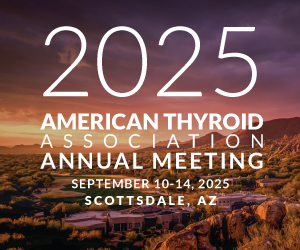February 26, 2000
The American Thyroid Association and The Thyroid Society for Education and Research have jointly developed and endorsed the following response to the recent warning issued by the U.S. Food and Drug Administration about the use of “Triax Metabolic Accelerator.”
In November 1999, the Food and Drug Administration issued a warning to consumers not to consume a product being sold as a dietary supplement called “Triax Metabolic Accelerator.” The concern cited by the FDA was that the active product in Triax is TRIAC (3,5,3′-triiodothyroacetic acid; also called tiratricol), has significant potency as a thyroid hormone, and that over-treatment with Triax could lead to serious health consequences.
Dietary supplements are products that are intended to augment an individual’s consumption of one or more of the following dietary ingredients: a vitamin, a mineral, an herb or other botanical, an amino acid, or a concentrate, metabolite, constituent, extract, or combinations of these ingredients. This definition was adopted after passage of the Dietary Supplements Health and Education Act of 1994, which broadened the scope of what could be sold without a prescription as a dietary supplement. However, the same Act permits the FDA to regulate the use of any supplement that it finds to present “a significant or unreasonable risk of illness or injury.” It is this risk of injury that led the FDA to issue it’s warning about Triax. The FDA’s warning may be found at the following address: http://www.fda.gov/bbs/topics/answers/ans00984.html.
TRIAC is a metabolite of thyroid hormone in humans. Usually, about 1% of a person’s thyroxine (T4) is converted to TRIAC. Carefully designed studies performed in humans lacking a thyroid gland have demonstrated that TRIAC, when taken by mouth, is capable of producing biologic effects similar to thyroxine, although with about 5% the potency of thyroxine. Thus, taking 1000 micrograms of TRIAC by mouth is roughly equivalent to taking 50 micrograms of thyroxine. Certain organs in the body appear to be more affected by TRIAC than others, particularly the bones and the liver.
Overdosage of TRIAC can lead to symptoms of thyrotoxicosis, including but not limited to fatigue, rapid heart rate, weight loss, feeling hot, anxiety, and shakiness. At the doses recommended by the supplement’s manufacturer, 2-4 1000 microgram capsules each day, many people will experience the same thyrotoxic side effects that they would develop if they consumed 100-200 micrograms of thyroxine. If blood tests are performed, the serum TSH and total T4 concentrations will be low; due to the suppression of pituitary-thyroid axis, while the serum total T3 level may be high, due to the cross-reactivity of T3 and TRIAC in most assays.
Weight loss occurring as a result of TRIAC therapy is accompanied by the same risks of thyrotoxicosis as those occurring with overdosage of thyroxine (T4) or triiodothyronine (T3). Therefore, TRIAC should not be used to accelerate weight loss.



